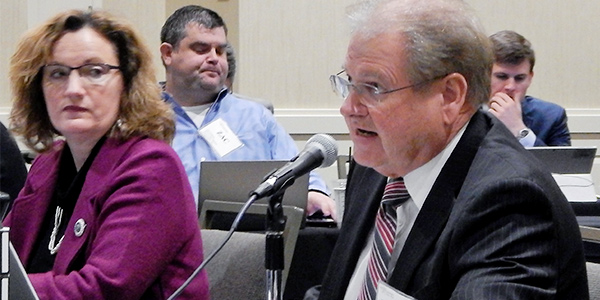SANTA FE, N.M. — The SPP Cost Allocation Working Group (CAWG), composed of regulatory staff from across the RTO’s footprint, told their state regulators Monday that they plan to establish a narrow byway facility cost allocation review process, rather than just evaluate the process as first directed.
CAWG Chair John Krajewski, a consultant with the Nebraska Power Review Board, explained to the Regional State Committee that the group determined the Holistic Integrated Tariff Team’s recommendation that it evaluate a process through which costs for specific 100- to 300-kV projects can be fully allocated on a regionwide basis was not sufficient.
“‘Evaluate’ really means ‘go out and do it,’” Krajewski said. “The consensus of the group was that HITT’s intention was for us to put together a process for how this will look.”
Krajewski said the CAWG is “working towards having language” the RSC can adopt in the form of a white paper. The HITT’s timeline has the group completing its work in July, a schedule he called “aggressive.”
The CAWG is also recommending that projects eligible for the byway cost-allocation review process should include both new and existing Schedule 11 facilities. The recommendation excludes directly assigned upgrades.
RSC Approves Renewables’ Capacity White Paper
The RSC unanimously approved a staff white paper proposing a methodology for prioritizing and allocating the available effective load-carrying capability (ELCC) from wind and solar generating facilities that qualify as capacity in SPP’s balancing authority area.
Staff last year completed the study, which revealed that while wind resources’ total capacity increased with penetration, the accredited percentage of capacity related to the nameplate of each individual resource decreased.
The committee also approved Landmark Certified Public Accountants’ selection to audit its 2019 financial statement and the Business Practices Working Group’s revisions (BPWG RR369) to a business practice (BP 7060) that establishes cost-estimating processes and reporting requirements if project costs are projected to go outside an established bandwidth.
The changes close oversight gaps for projects that receive base plan funding but are not issued a notification-to-construct; clarify when oversight begins; and provides that the project owner is required to submit certain information as part of closeout processes.
Louisiana PSC’s Francis Joins Committee
The meeting marked NPRB Member Dennis Grennan’s first as RSC president and Louisiana Public Service Commissioner Mike Francis’ first as a member. Francis replaces Foster Campbell, who made a memorable appearance during October’s RSC meeting in Little Rock, Ark. (See “Louisiana’s Campbell: SPP Spending ‘Extravagant’,” SPP Regional State Committee Briefs: Oct. 28, 2019.)
— Tom Kleckner






